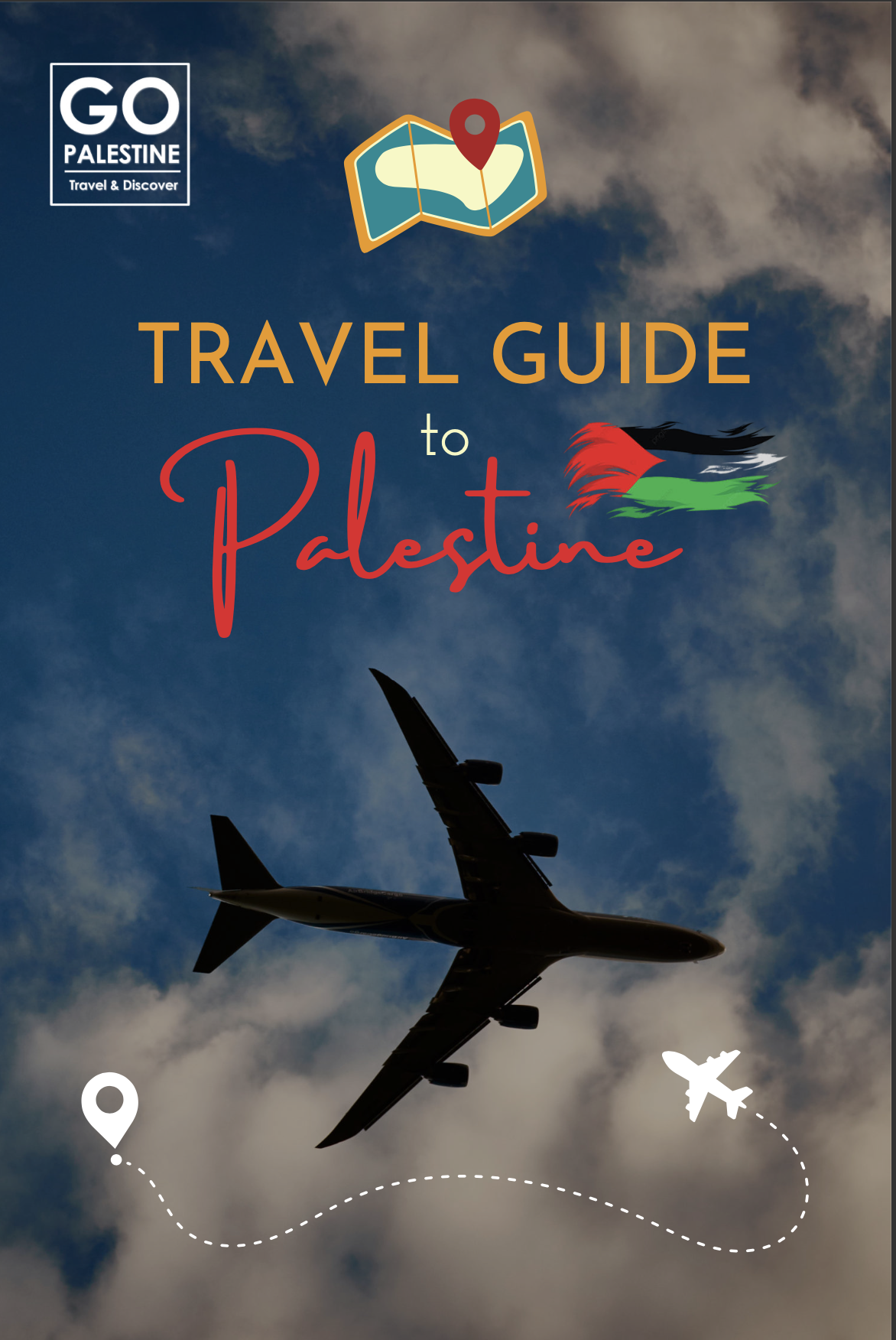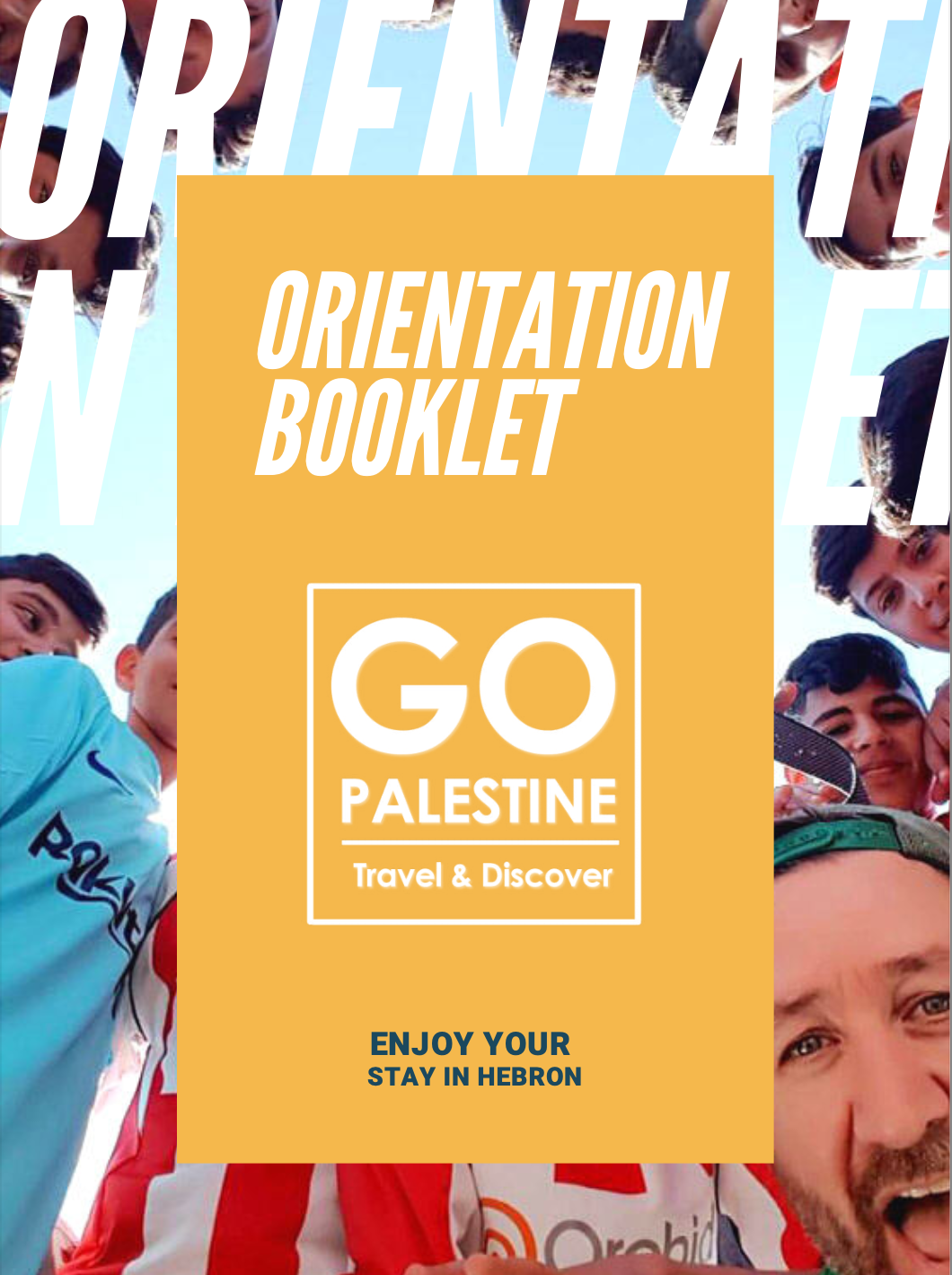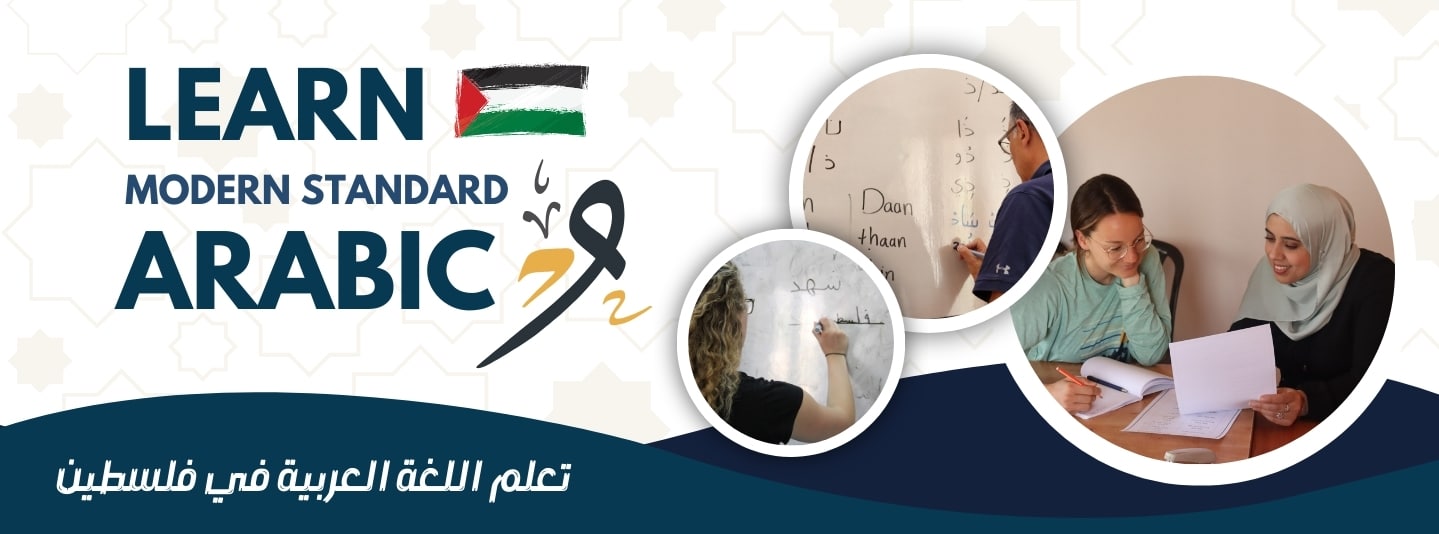
The Study Modern Standard Arabic (LMSA) program in Palestine is one of the linguistic programs offered by Go Palestine in Hebron to internationals from all over the world who desire to study Modern Standard Arabic (MSA). Modern Standard Arabic is the language of education, media, and journalism in the Arab world. The MSA program offers four educational hours a day for intensive courses or six educational hours a day for super intensive courses.
Modern Standard Arabic (MSA) (Known as Fusha or Standard Arabic) is standardised literary form of Arabic used from the 7th century and throughout the Middle Ages. Similar to Contemporary Latin, MSA is a language that is used in literature, academia, print and mass media, law, and legislation but is typically not spoken as a first language. It is a pluricentric standard language that is taught in formal education across the Arab countries, and it differs significantly from many vernacular varieties of Arabic that are typically spoken as mother tongues in the region.
The Study Modern Standard Arabic (LMSA) program in Palestine is individual classes (one to one) which means that our classes are customised according to your linguistic needs. This gives you more focus on the language skills (listening, speaking, reading, and writing) that you want specifically to learn in an integrative way
Why you should study Arabic?
- The Arabic language or the language of Daad is one of the most widespread languages within the group of Semitic languages, in the countries of the Arab world in addition to many other regions such as Turkey, Ahwaz, Mali, Chad, Senegal, Ethiopia, Eritrea, Iran, and South Sudan.
- The Arabic language represents an ancient Arab and Islamic culture and civilization, and it is a living, contemporary language that represents a wide segment of human societies that belong to a vital geographical area that is the focus of the world’s attention.
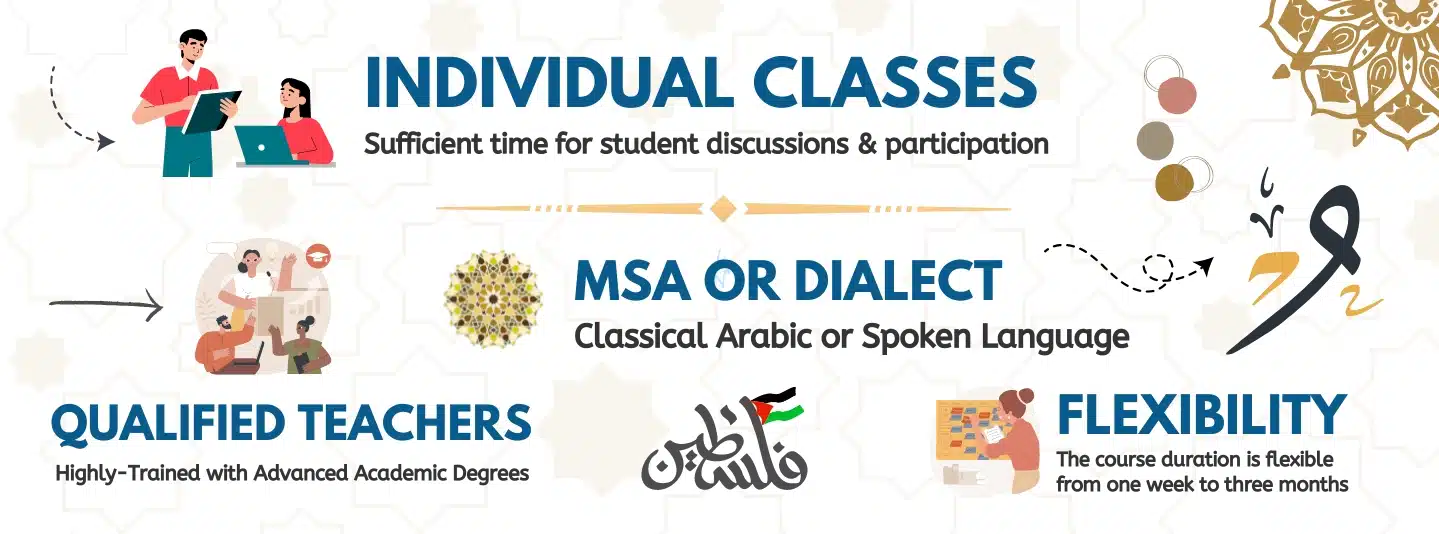
- Given the increasing demand for Arabic language learning by non-native speakers, for various motives; Political, diplomatic, economic, religious, cultural, educational, touristic, communicative, and others and the Arab Library’s lack of quality programs concerned with teaching Arabic, the Palestinian Center for Education worked to build an integrated program for teaching Arabic to non-native speakers to achieve the beneficiaries’ goals in a distinctive, updated and unconventional educational style.
How does being in Palestine help you improve your Arabic?
In order to fully grasp a foreign language, one must spend time in a country immersed in it. You can only learn so much by sitting in a classroom and, in order to break the barrier of fluency and understanding of the language, one should seriously consider studying abroad.
Palestine, unlike many other popular studies abroad destinations for Arabic learners, has an extremely small ex-pat community and it is less common to hear English spoken in daily life. Thus, you will be forced to communicate and navigate the country while using Arabic.
Specifically, within Palestine, the Palestinian Center in Hebron gives you all the tools and opportunities you need to engage in the culture, become a part of the society, and develop close relationships with people in the city to maximize your learning experience and progression in Arabic.
IMPORTANT Links/Files
| Our Video Gallery | Get to Know us! (Pdf file) |
| Our Photo Gallery | Our Volunteer Programs |
| Reviews on Go Abroad | Our Internship Programs |
| Reviews on Go Overseas | Study Arabic ONLINE! |
Who teaches the Modern Standard Arabic (MSA) courses in Palestine?
Our team of experienced and skilled Arabic teachers are dedicated to providing the best learning experience for our students. Our teachers not only hold degrees in Arabic language and Arabic literature, but also have years of teaching experience. They use interactive teaching methods that make the lessons engaging and interesting for the students.
Our teachers are passionate about helping students learn the language and culture of the Arab world. With their guidance, you can gain a deeper understanding of the language, as well as its cultural context. Whether you are a beginner or an advanced learner, our teachers will help you improve your skills in both spoken and written Arabic.

Majd Alameh

Duha Amro

Dua'a Qasim

Bessan Muhtaseb

Shourouk Dwaik

Nadine Mahmoud

Moh’d Nasser

Ahlam Odeh

Ayah Safi

Eyad Abu Zenah

Shatha Naneesh

Katia Nakhleh
Brief Information About Study MSA in Palestine Program!
| Place of Program | Hebron, Palestine |
| Program Fees | Intensive = Starting from 430$ American Dollars Non-Intensive = Starting from 315$ American Dollars |
| Age | 18-70 Years Old |
| Minimum Duration | Intensive = One Week – 20 Hours Non-Intensive = One Week – 12 Hours |
| Maximum Duration | 12 Weeks |
| Teaching Hours | Intensive = 4 hours a day – 5 days a week. Non-Intensive = 4 hours a day – 3 days a week. |
| One Teaching Hour | 45 Minutes |
| Average students in class | 1 – 2 Students |
| Class periods | Morning (8:30 – 12:30), Afternoon ( 12:30 – 16:00) |
| Starting/Ending Dates | Flexible – Anytime |
| Application Deadline | No Deadline |
| Days off | Two days a week including Fridays |
| Educational Degree | Not Required |
| University Credit | Available |
When do MSA courses in Palestine take place?
The Study Modern Standard Arabic program in Palestine gives you the flexibility to determine the start and end dates for your Arabic program schedule.
- Arabic students arrange and coordinate their schedules with the Center’s administration.
- Arabic classes in Palestine may be arranged from one week up to three months.
Two Types of Modern Standard Arabic (MSA) courses in Palestine:
1. Intensive MSA course (one on one)– 5 Days a Week
- The student takes five days of lessons per week. Each lesson lasts for four hours. This is a total of 20 hours per week. The week begins on Sunday and runs through to Thursday (Friday, the day of worship and rest, and Saturday is the “weekend” in Palestine).
- This intensive Modern Standard Arabic (MSA) is ideal for those who wish to learn Arabic intensively and in a short period of time. This type of course is recommended for those who want to learn as much language as possible during their short stay in Palestine.
2. Regular MSA course (one on one) – 3 Days a Week
- The student takes three lessons per week for four hours per lesson for a total of 12 hours per week. The week begins on Sunday and runs through to Thursday (Friday, the day of worship and rest, and Saturday is the “weekend” in Palestine).
- This non-intensive Modern Standard Arabic is suitable for people who lack the time necessary to participate in daily lessons, or they simply need more time to follow up on what has been learned in the lesson, or to finish homework. Some students wish to have more time for visiting landmarks in Palestine, as well as learning the Arabic language.
- The non-intensive Modern Standard Arabic may be suitable for foreigners living in Palestine and working in international or local institutions. Those who live in Israel who would like to learn Modern Standard Arabic (MSA), such as students and workers, but with limited time for language lessons may appreciate a more abbreviated lesson schedule.
Where do I live while studying Modern Standard Arabic in Palestine?
The Palestinian Center will arrange your living quarters with either a Palestinian host family or at our dorm in Hebron, which is conveniently located to the city center and within easy reach to supermarkets, restaurants, and public transportation. Daily breakfast at the Center with other internationals is included in the program.
| Living Cost | Approx. 50$ a Week |
| Meals Provided | Daily Breakfast at the Center |
| Accommodation | At a Host Family or at Our Dorm |
| Weekend | On Friday |
| Wifi Access | At the Center, Host Family & Our Dorm |
| Currency | Israeli Shekel (NIS) |
| Transportation | Taxies & Mini-Vans |
| Weather | Summer (25-30°C), Winter (0-9°C) |
| Airport | Ben Gurion Airport in Israel – No Airport in Palestine |
What happens when I’m not studying Arabic?
Besides studying Arabic in Palestine, you will have plenty of opportunities to participate in our social, cultural, and community activities. Many community activities in Hebron are organized and presented by the center. Additionally, the Center organizes visits to local sites of interest in the city of Hebron.
Sightseeing may include visits to the Old City and its many souqs and markets, the Ibrahimi Mosque, a refugee camp, the Russian Orthodox Church is known for its beautiful gold dome, and the glass factories, to name a few destinations. Hebron is a city full of cafés and restaurants where you can spend an enjoyable time.
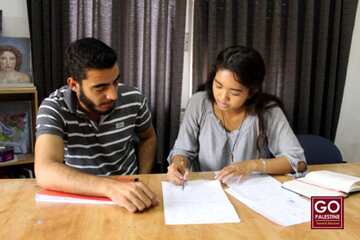
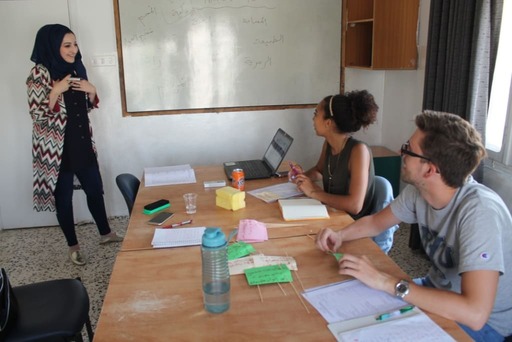
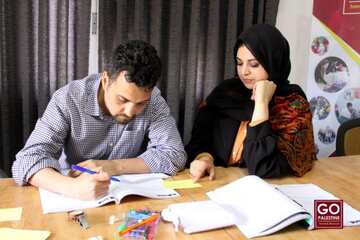
Arabic Placement Test
Students who have a knowledge of Arabic or who have already studied Arabic will need to take an exam to assess their language skill abilities before deciding on the required level of study.
Who is eligible to apply to Modern Standard Arabic program?
- Participants between the ages of 18-70 are eligible to participate in the Modern Standard Arabic (MSA) program.
- No academic degree is required in order to apply.
- Those who are younger than 18 years old can also apply but with one condition. One of your parents has to fill out and sign a parental consent form.
What does your weekly schedule look like?
The First Arabic Class starts at 8:30
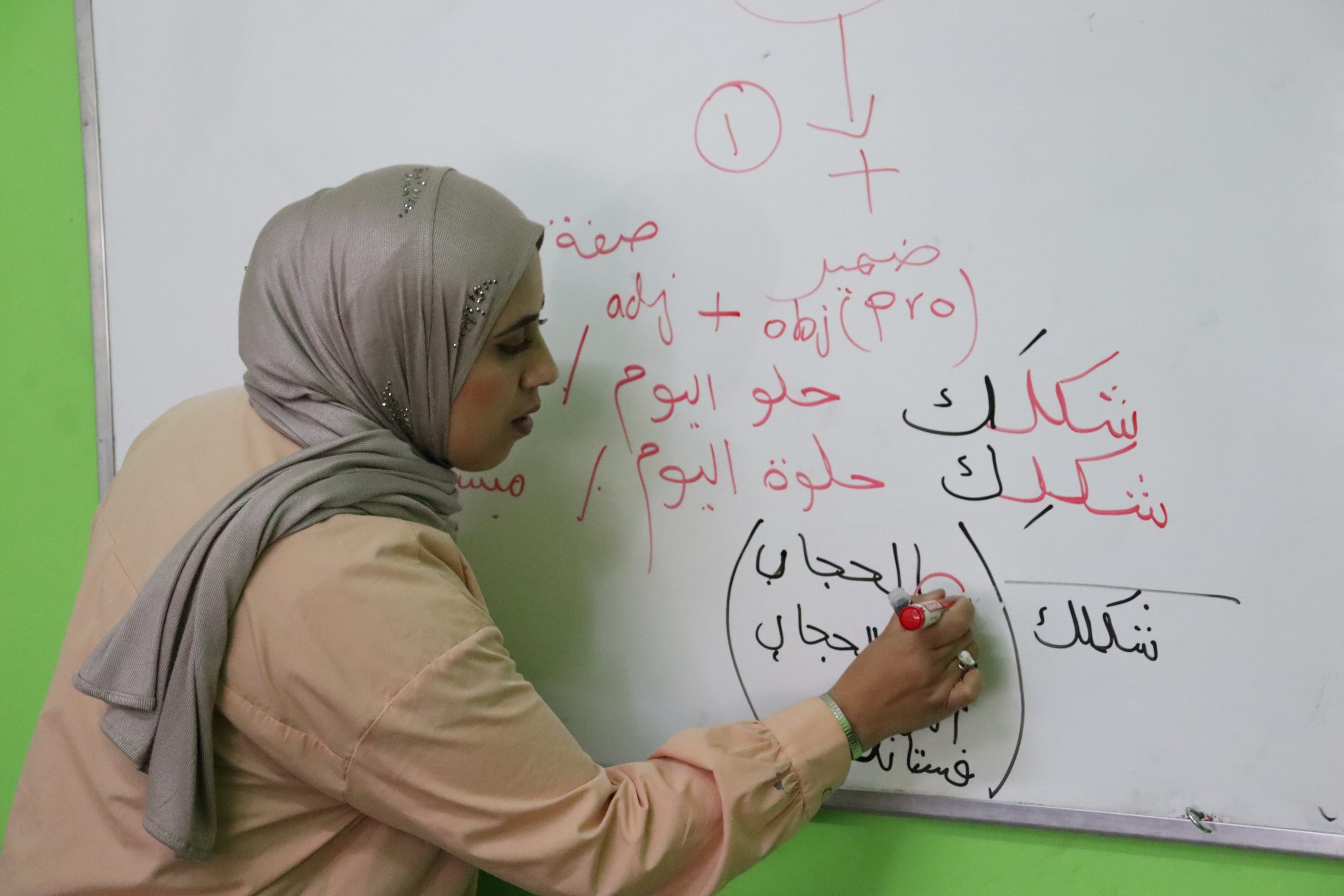
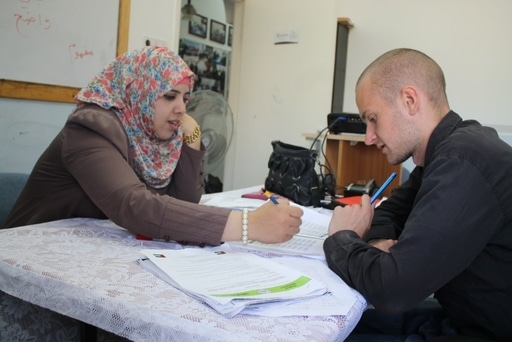
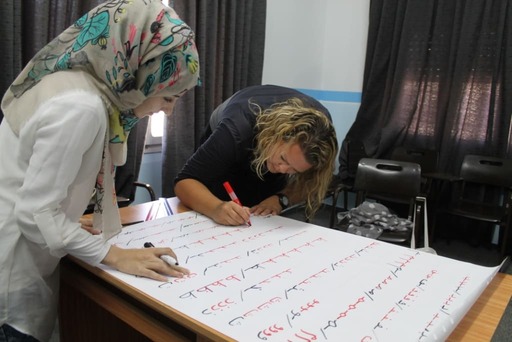
Breakfast starts at 9:30 am
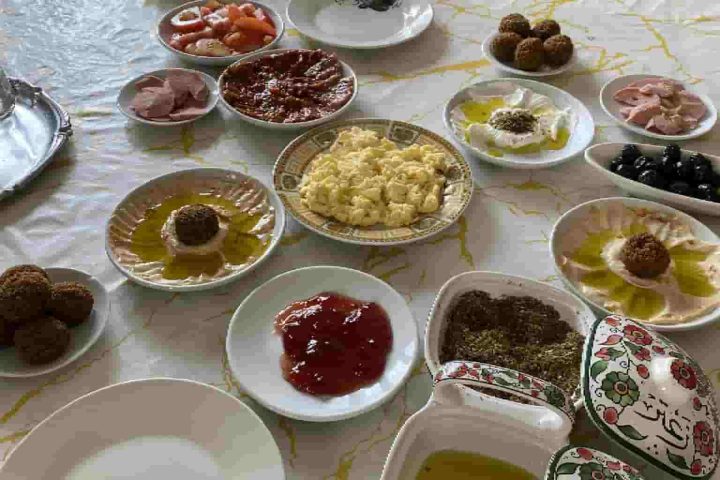
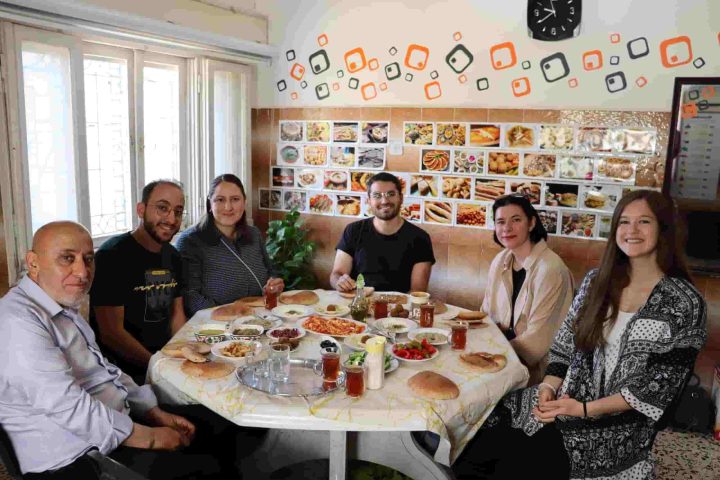
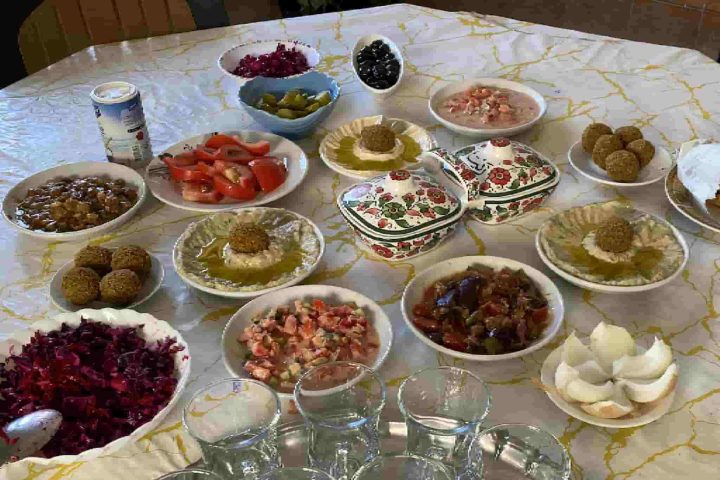
The second Arabic Class starts at 10:15
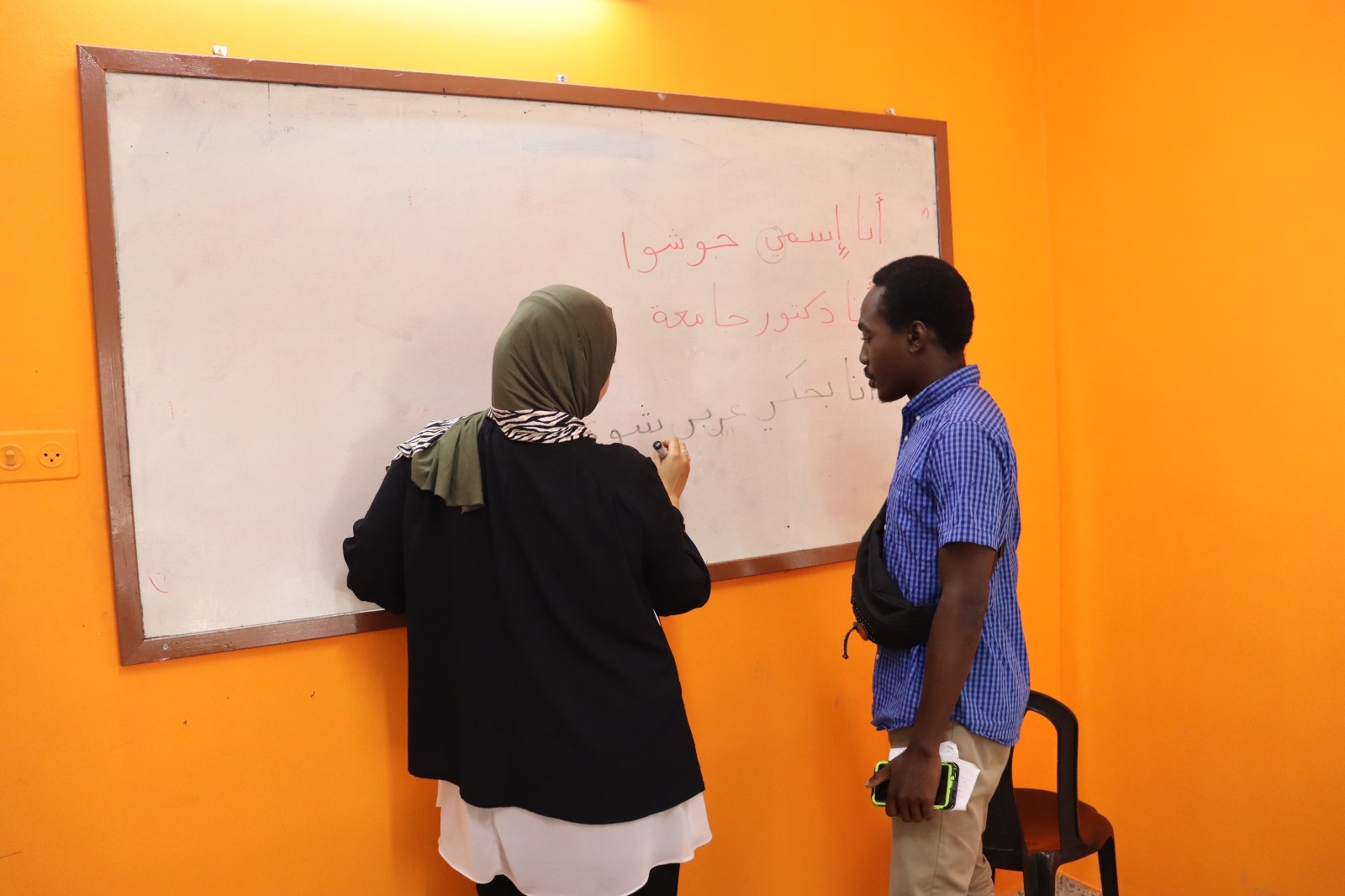
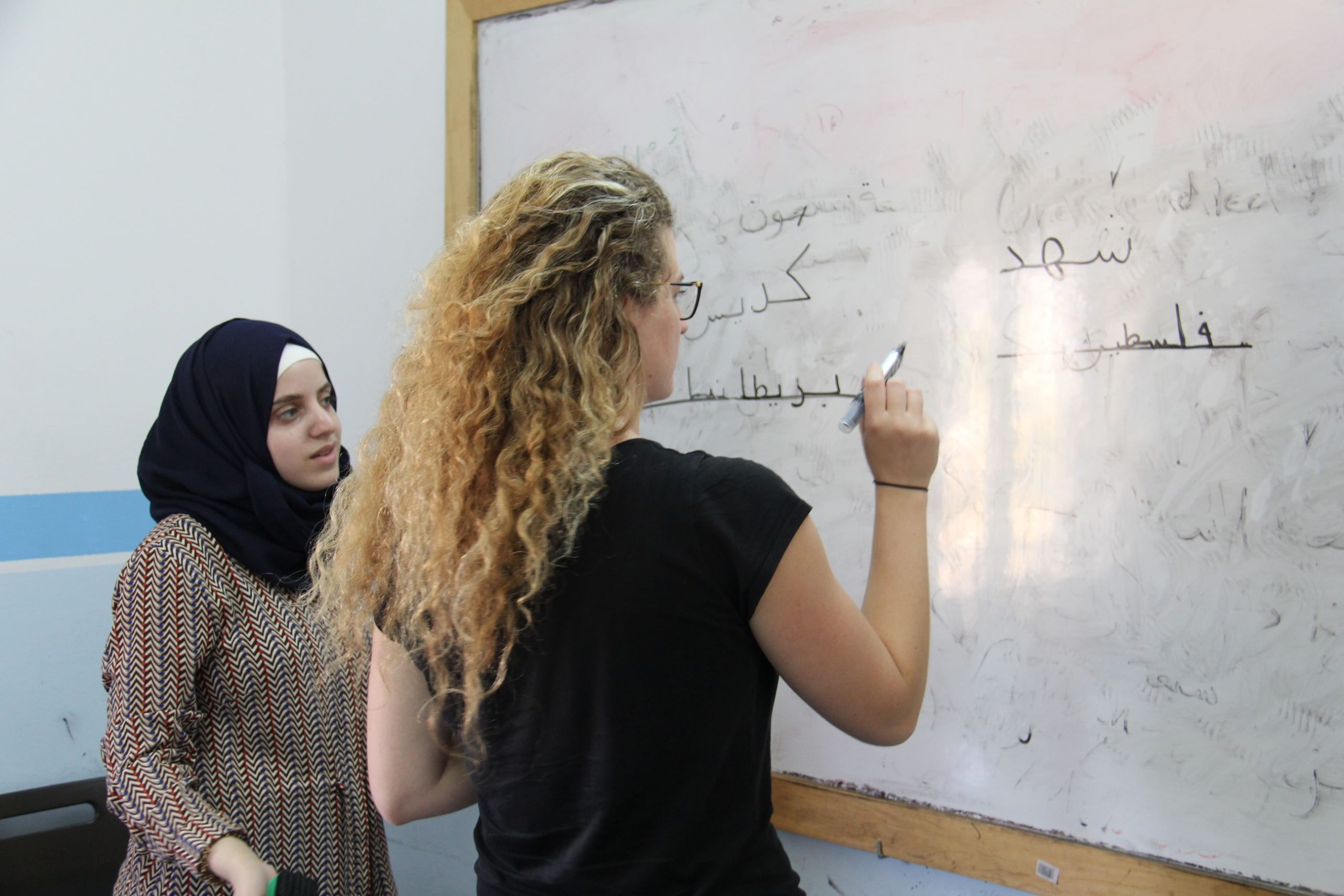
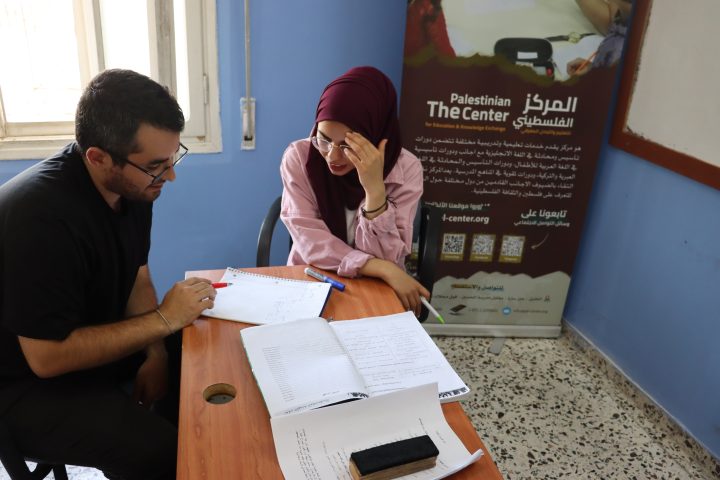
The Third Arabic Class starts at 11:20
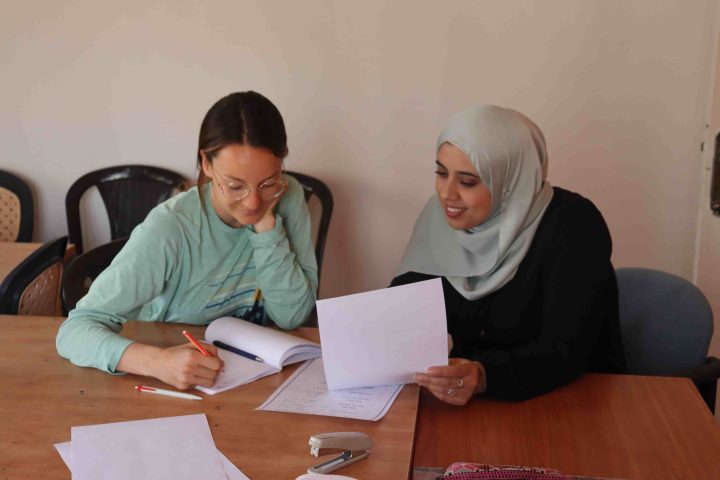
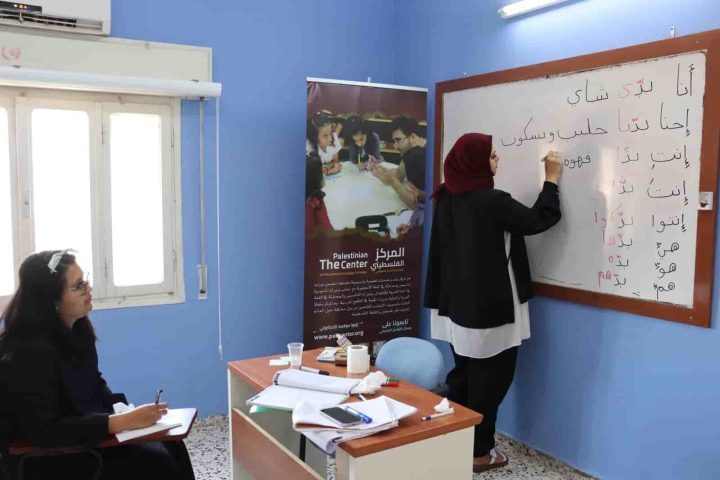
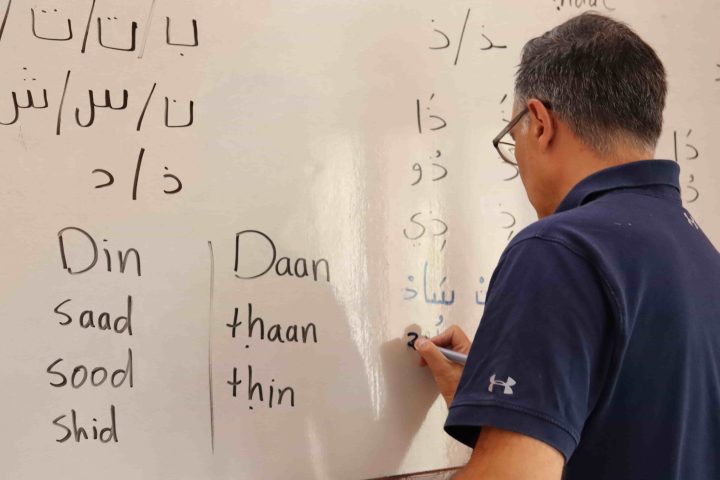
homework & Revision starts at 12:20
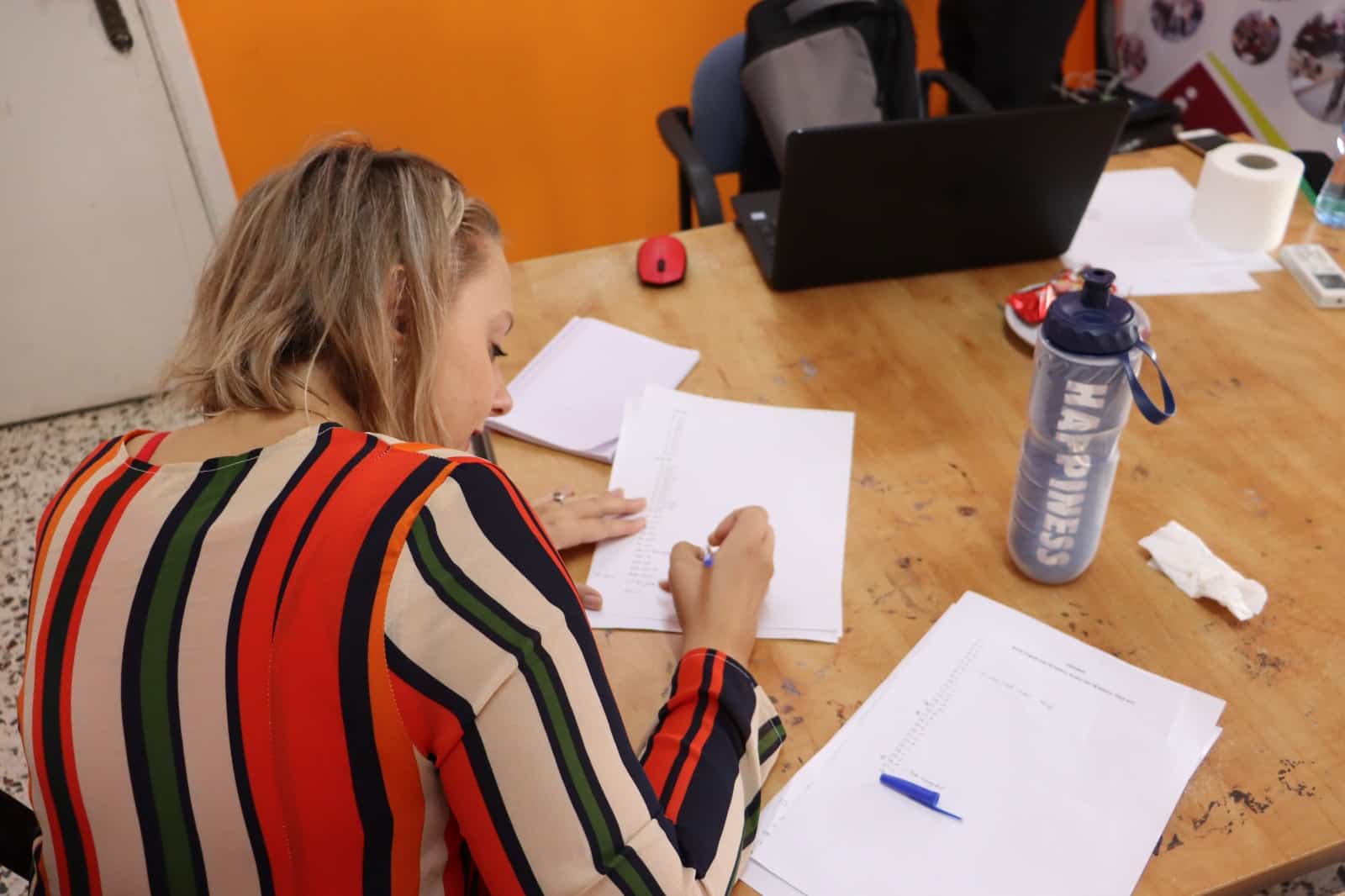
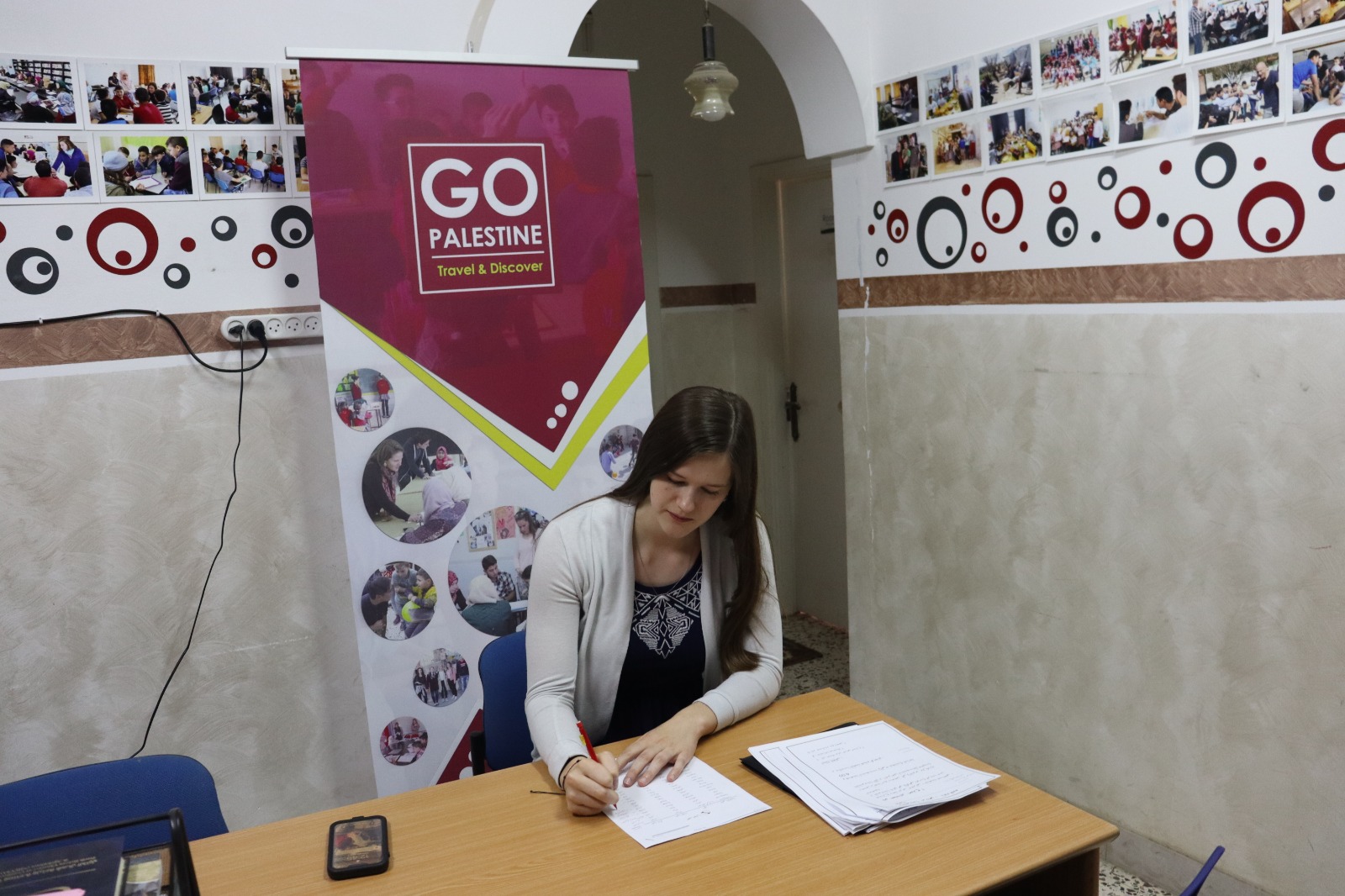
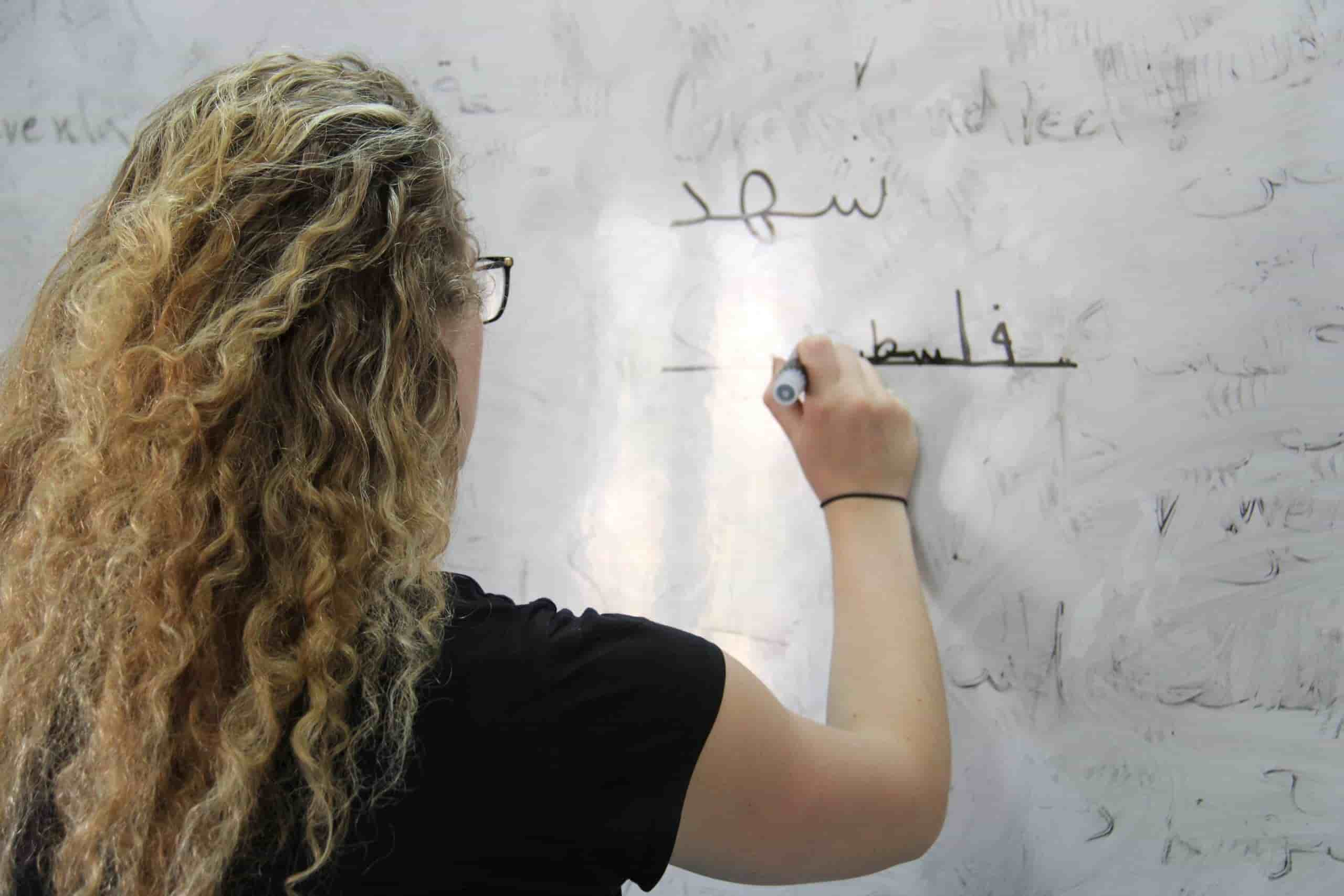
Lunch Break starts at 2:00 pm

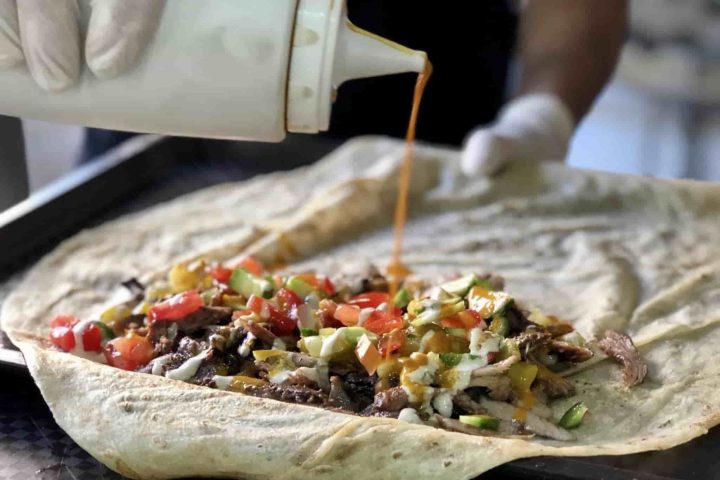
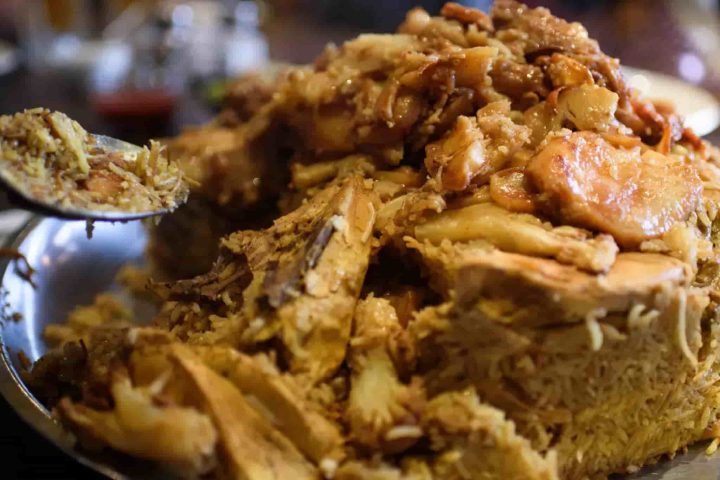
Day Trips to Refugee Camps in Bethlehem & Hebron
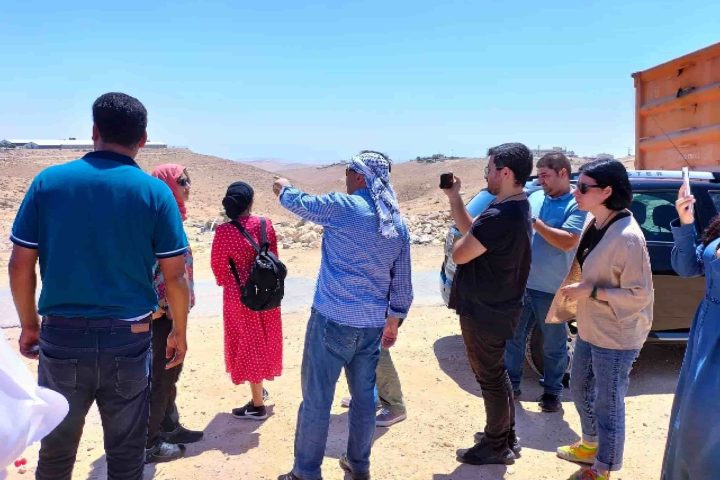
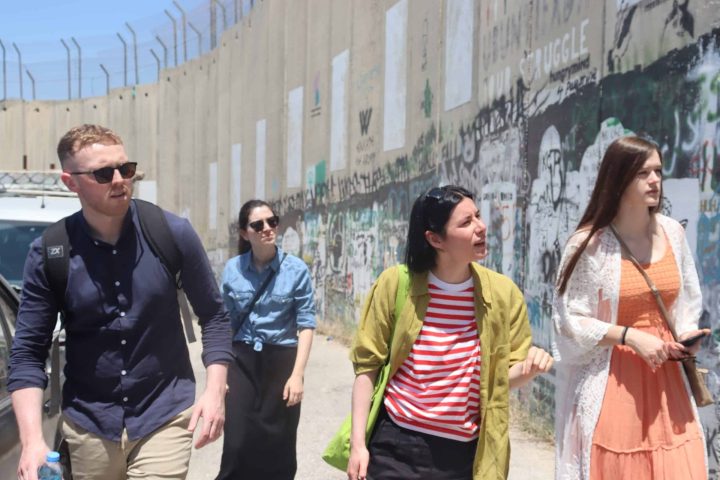
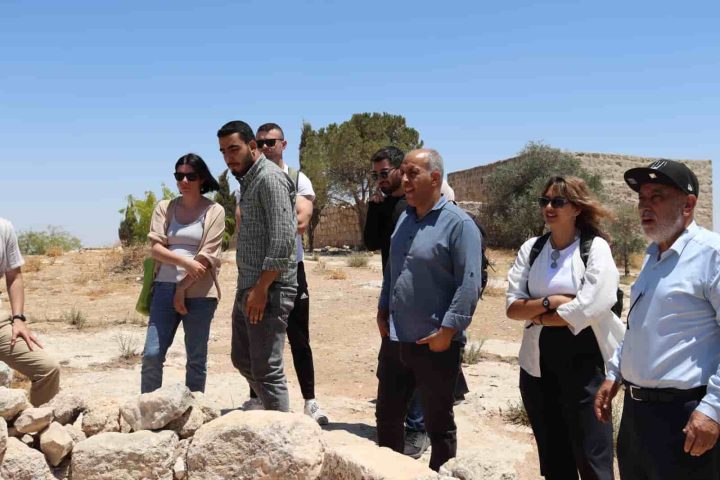
Local Visits to Learn about the Landmarks of the city of Hebron
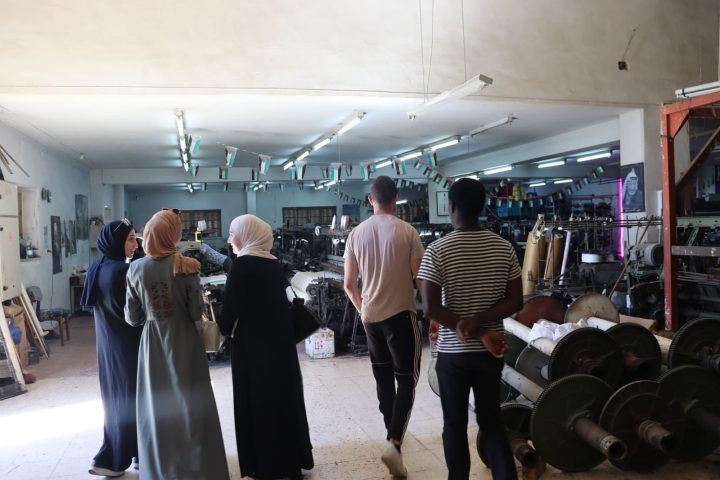
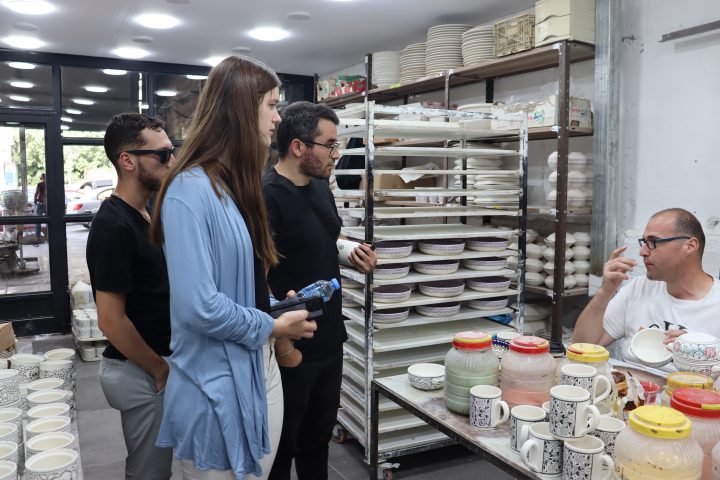
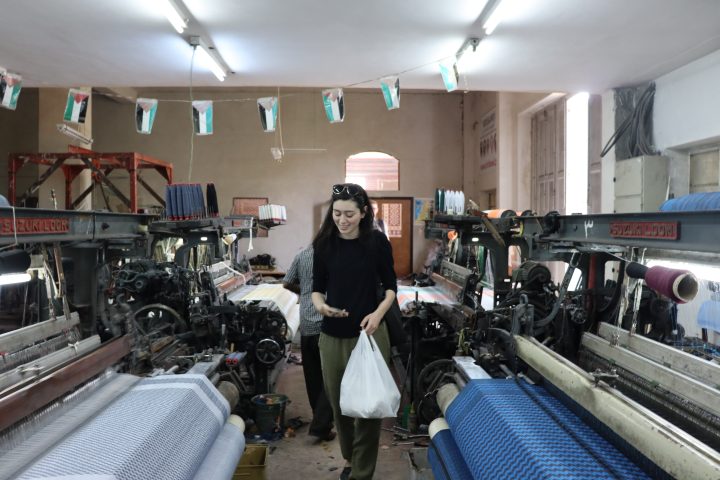
Prepare & Cook a Traditional Palestinian Dish
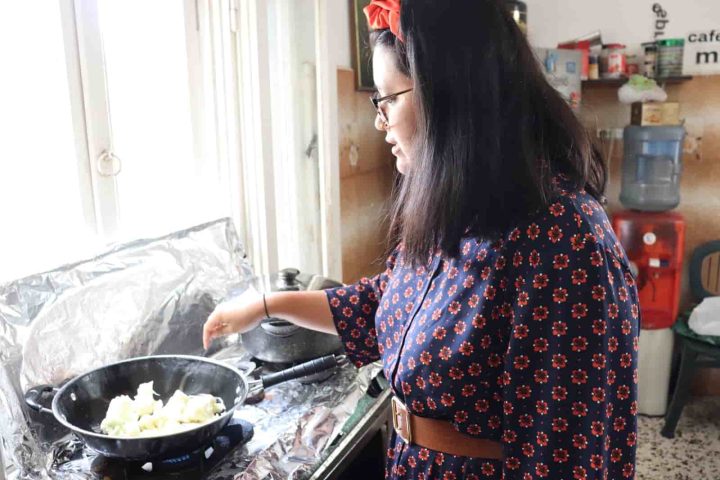
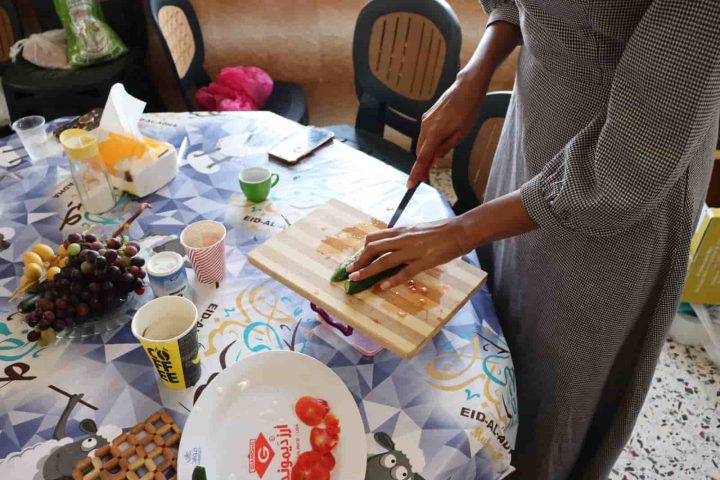
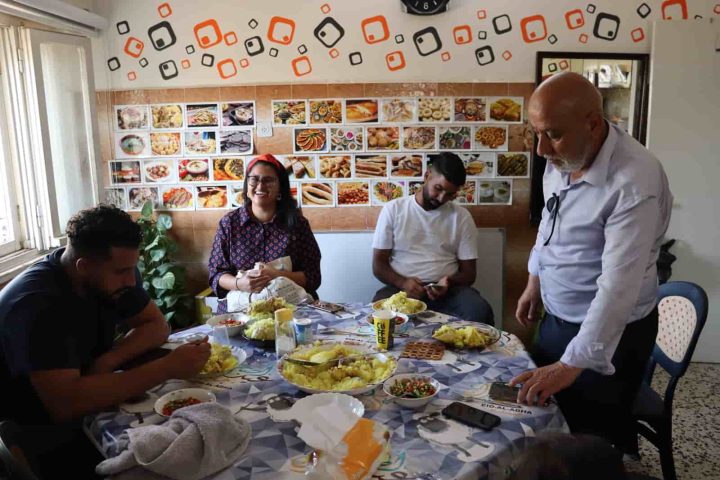
Free Time starts at 16:00 or at 16:30
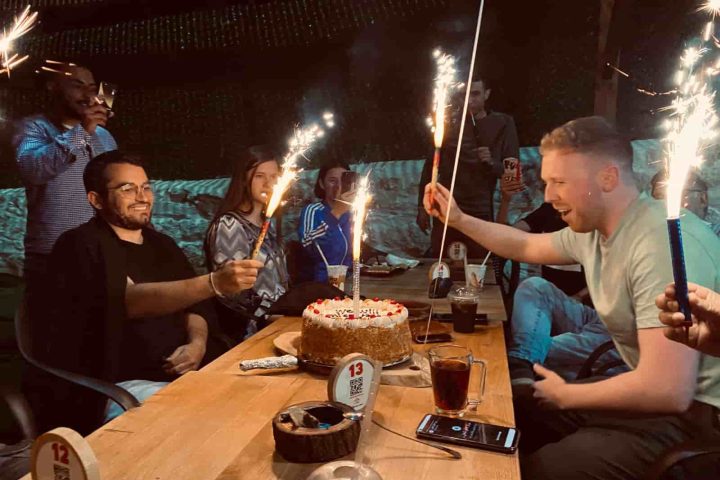
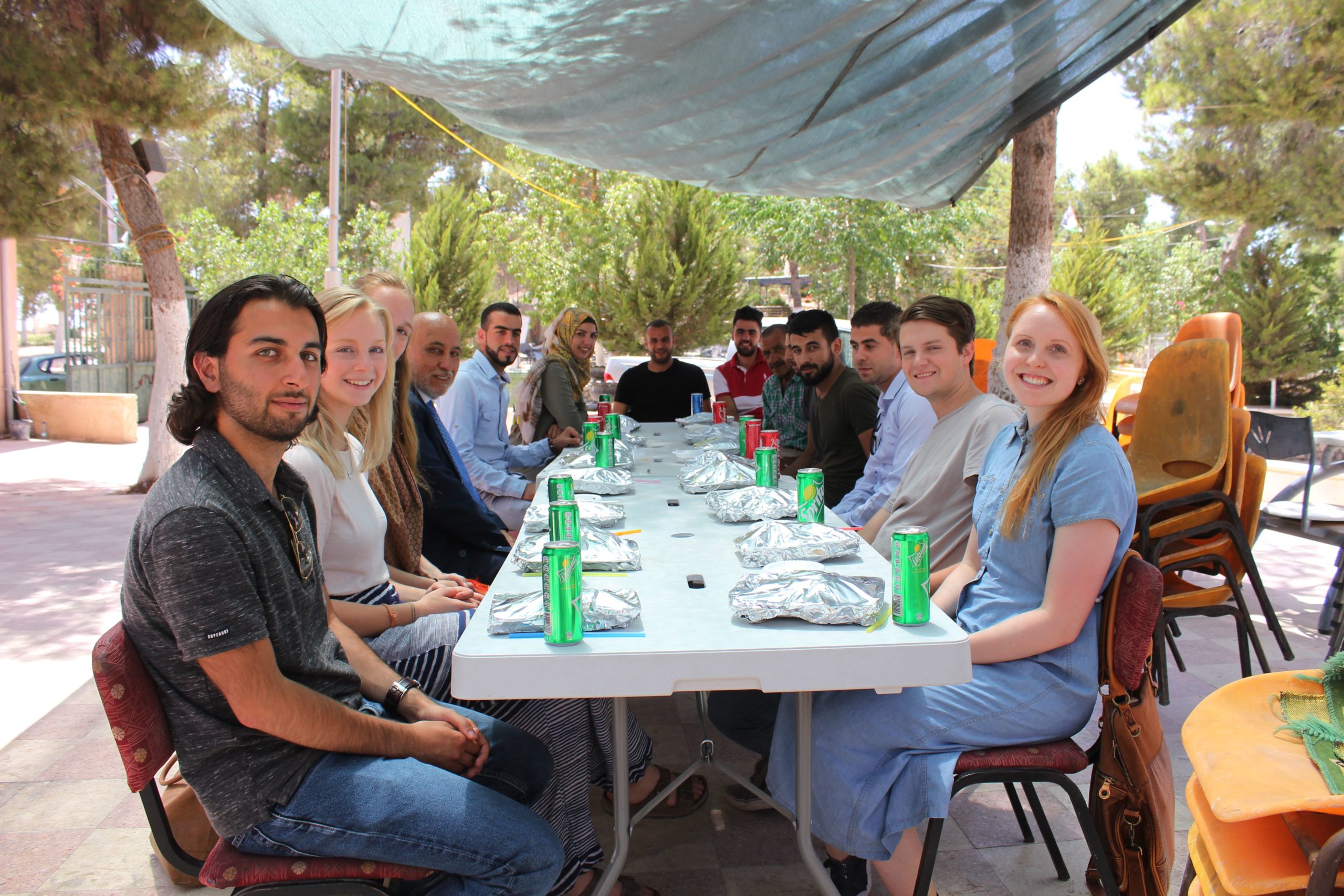
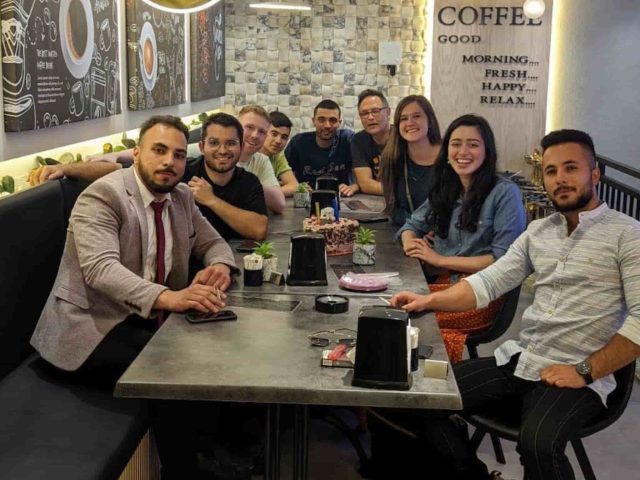
Some of Our Students Reviews
The Palestine Center - Go Palestine was the most responsive. Scheduling the lessons with my teacher has been easy and pleasant. My teacher has accommodated me in allowing me to continue with my college textbook in Modern Standard Arabic. She is also giving me writing, reading and speaking work. I love having the direct connection with Arabic culture through Arabic language. I value that my teacher is finishing her own higher level Arabic literature studies, has studied other languages and is an experienced Arabic language teacher. I look forward to my lessons and and am glad to have found the Palestinian Center.

Michael Davis
United StatesMy experience at the Palestinian centre has been very positive. I have taken the Intensive Arabic Course and I have seen great improvements in my language skills. I have spent only 2 weeks in Palestine this summer, but I would like to return later on for a longer period. The centre organizes interesting activities every day, so the programmes are also a great chance to learn more about the people of Hebron, Palestinian-Israeli relations and life under occupation. As someone that works in education, I am convinced that Go Palestine offers a great formative experience for those interested in the Arabic language and in the culture, politics and history of Palestine.

Francesco Belcastro
United KingdomMy tutor Dua'a has been fantastic! Bearing in mind I am learning as a complete beginner (as well as learning online which presents its own set of challenges) my tuition has been fun, engaging, challenging, and rewarding in equal measure. My tutor has been exceptionally accommodating and supportive of my Arabic language journey. Arranging lessons was always easy and straightforward, and the content was always at just the right level to challenge me, but remain fun. I look forward to having more lessons in the future.

Jacob
United KingdomI highly recommend the Go Palestine Arabic Language Online Program. It is well organized and interactions are pleasant. My teacher is a wonderful teacher, she speaks English very well and she also brings great enthusiasm to her work. She has a good understanding of where the gaps are in my knowledge of the Arabic language. This enables her to select and prepare the material for each lesson carefully. The first lesson is free, but I immediately signed up for the next one. I really appreciate the format through Zoom, very flexible and compatible with my own work.

Paula van der Hijden
NetherlandsI stayed in Hebron for one month with a Palestinian host family and completed the intensive Arabic course at Go Palestine. I cannot even begin to describe my time here in Palestine, and how happy I am that I chose this experience. I’ve had the opportunity to learn more about the occupation and Palestinian daily life through visits to several organizations, museums, and refugee camps, along with massively improving my Arabic skills.
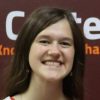
Sydney Gwidt
United StatesMy experience has been very good. I meet with my teacher for an hour every week. My teacher is very talented and shares my enthusiasm for the language. My teacher, Ustaz Muhamed, seems to know how to give my vocabulary that extra push without overwhelming me. I am very glad that I came across this program.

Jonathan Brandon
United StatesProgram Fees (in American dollars):
1. Intensive MSA Course – 5 Days a Week
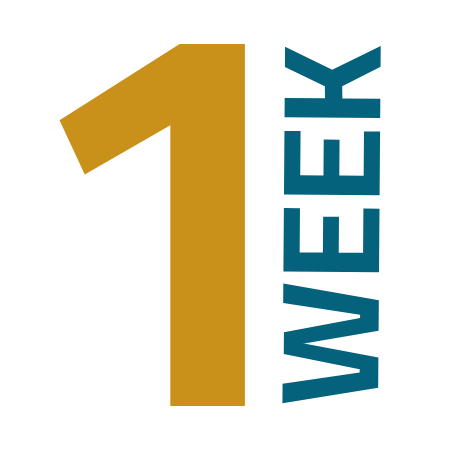
430$ (American Dollar)
This includes 20 hours of Arabic classes, accommodation, local visits, day trips, daily Palestinian breakfast, and a certificate of participation.
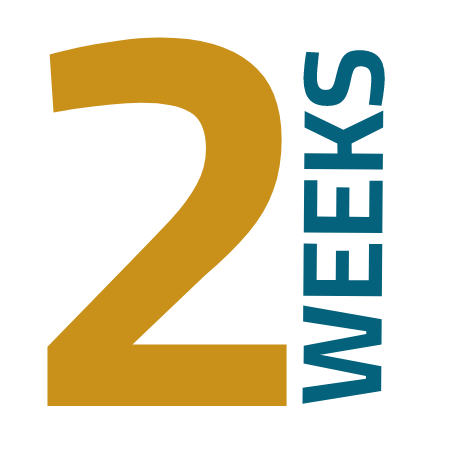
775$ (American Dollar)
This includes 40 hours of Arabic classes, accommodation, local visits, day trips, daily Palestinian breakfast, and a certificate of participation.
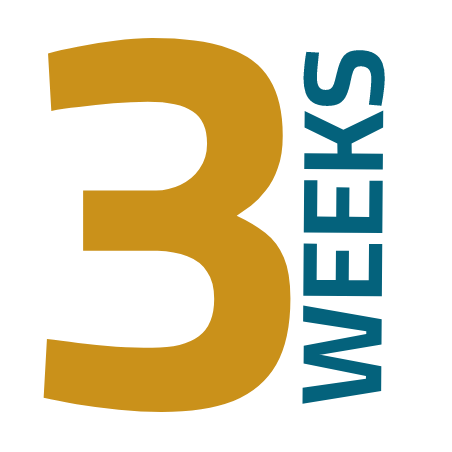
1100$ (American Dollar)
This includes 60 hours of Arabic classes, accommodation, local visits, day trips, daily Palestinian breakfast, and a certificate of participation.

1450$ (American Dollar)
This includes 80 hours of Arabic classes, accommodation, local visits, day trips, daily Palestinian breakfast, and a certificate of participation.

2850$ (American Dollar)
This includes 160 hours of Arabic classes, accommodation, local visits, day trips, daily Palestinian breakfast, and a certificate of participation.

4350$ (American Dollar)
This includes 240 hours of Arabic classes, accommodation, local visits, day trips, daily Palestinian breakfast, and a certificate of participation.
2. Non-Intensive MSA Course – 3 Days a Week

315$ (American Dollar)
This includes 12 hours ofArabic classes, accommodation, local visits, daily Palestinian breakfast, certificate of participation.

575$ (American Dollar)
This includes 24 hours of Arabic classes, accommodation, local visits, daily Palestinian breakfast, certificate of participation.

875$ (American Dollar)
This includes 36 hours of Arabic classes, accommodation, local visits, daily Palestinian breakfast, certificate of participation.

1150$ (American Dollar)
This includes 48 hours of Arabic classes, accommodation, local visits, daily Palestinian breakfast, certificate of participation.

2450$ (American Dollar)
This includes 96 hours of Arabic classes, accommodation, local visits, daily Palestinian breakfast, certificate of participation.

3575$ (American Dollar)
This includes 144 hours of Arabic classes, accommodation, local visits, daily Palestinian breakfast, certificate of participation.
How to pay the fees? (Payment Options)
- You may pay your participation fees either by Bank Transfer or by Western Union or MoneyGram. Payment via Western Union and MoneyGram, you can do the transfer online using your credit card.
- Payment of fees and signing of the participation contract must be made to reserve your place in the program.
- In participation fees that exceed $800, the applicant can pay 40% in advance and the rest of the 60% must be paid 45 days before the date of participation.
- Unfortunately, the participation fees can’t be paid in cash, as we arrange your participation ahead of time.
How Do I Get A Visa To Enter Palestine?
Visas are routinely granted upon arrival at Ben Gurion Airport (Tel Aviv) if you are a citizen of an exempted country, or at the Allenby-King Hussein Bridge border crossing; Hamas controls the border in Gaza with Egypt. Tourist visas are valid for 90 days; most Americans and Europeans are issued three-month visas upon arrival and clearing customs.
If your home country does not have an exemption agreement with Israel, you will have to procure a visa from the Israeli embassy/consulate at home before you visit. Because many Arab countries do not accept Israeli stamps upon passports, Israel now issues their visa on a separate small card with a bar code indicating the visa time validity. Please keep this visa card WITH your passport at all times. You may check to see whether your native country participates in a visa exemption agreement.
Important Articles to READ – Please Click to Read
Documents you’ll receive from us!
The center will give you three important documents. First, a travel guide that tells you everything you need to know about getting to Palestine and reaching Hebron from the airport. Second, an orientation booklet about Hebron as a city, covering things like living there, the cost of living, expenses, and suggestions on how to spend your time in Hebron. Third, you’ll get a daily schedule so you know exactly what you’ll be doing each day of the week. It outlines the start and end of the week, and you’ll also have two days off. All this information will be in your daily schedule booklet.
How do I apply or receive additional information about MSA course?
Please send an email to Mr. Tamimi, at info@gopalestine.org. Please type “Study Modern Standard Arabic Program” or “Study MSA in Palestine” in the subject line. In the body of the email tell us of your interest, ask any questions you may have, and request an application. Very shortly we will reply to you.


